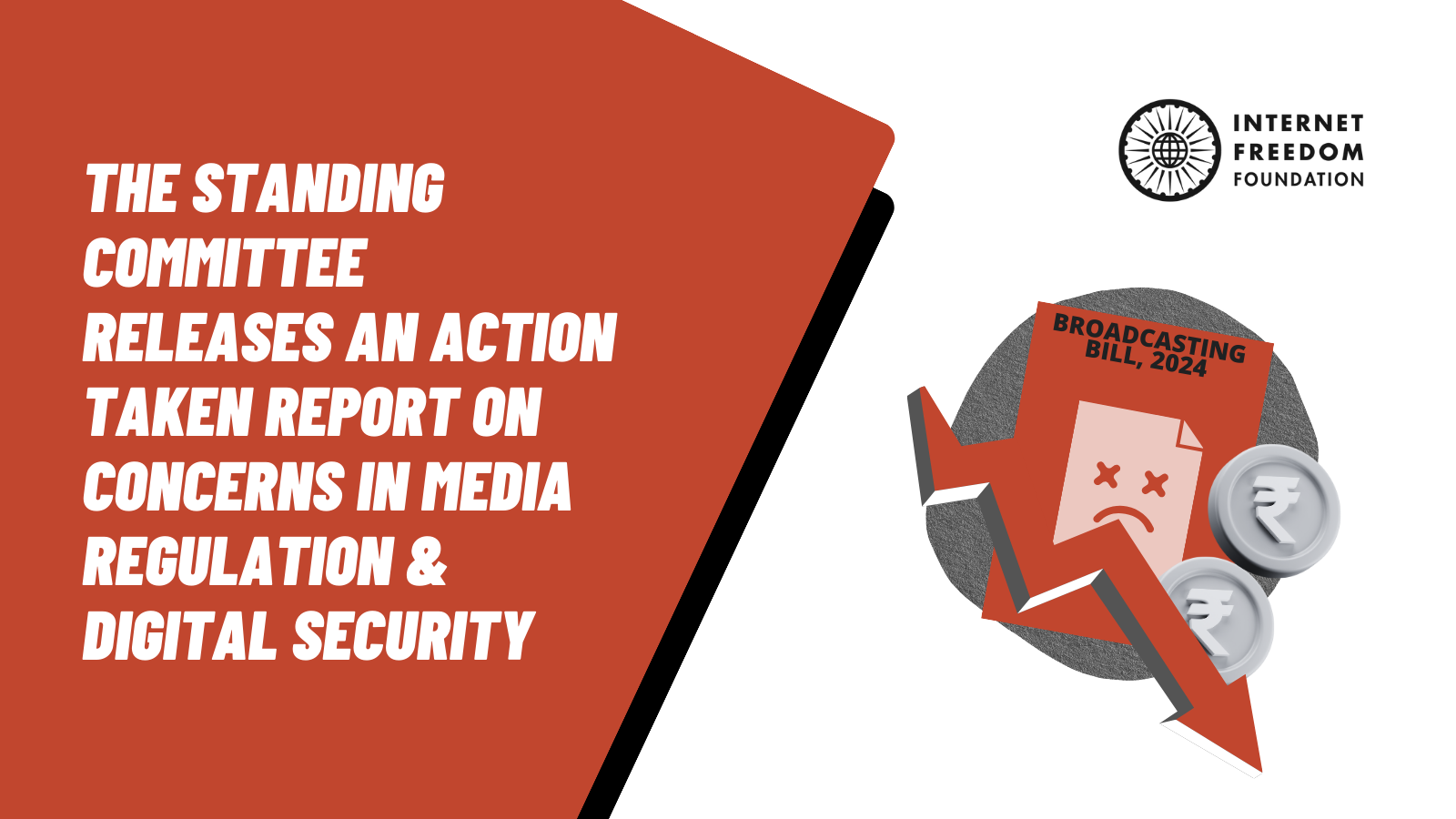
tl;dr
On March 11, 2025, the Parliamentary Standing Committee on Communications and Information Technology tabled reports highlighting concerns in media regulation and digital security. While one of the reports revives the Broadcasting Bill emerging from the moral panic around the India’s Got Latent controversy, the other warns of rising fraud in Aadhaar-linked digital payments but avoids accountability.
Background
On March 11, 2025, the Parliamentary Standing Committee on Communications and Information Technology (“Committee”) released two crucial reports that shed light on pressing issues in media regulation and digital security. These Action Taken Reports assessed how well the relevant ministries of the government have responded to the Standing Committee’s recommendations—and the findings raise serious concerns.
- The Sixth Report reveals the legislative resurrection of the Broadcasting Bill that has been criticised for increasing censorship powers of the Union Government. The report reviews actions taken by the Ministry of Information and Broadcasting (“MIB”) on the regulation of the Cable TV network, as outlined in the Committee’s Fifty-Sixth Report.
- The Seventh Report flags alarming risks in Aadhaar-linked digital payments, highlighting growing financial frauds and data security vulnerabilities. It examines the measures taken by the Ministry of Electronics and Information Technology (“MeitY”) on digital payments and online security for data protection, as discussed in the Committee’s Fifty-Fourth Report.
MIB’s Action Taken Replies
The Union Government, while responding through MIB to the Standing Committee’s observations and recommendations regarding regulation of Cable TV networks, confirms the existence of the version of the Broadcasting Services (Regulation) Bill, 2024. Despite previous claims that effectively claimed the 2023 draft was the only version, the MIB has now stated that the 2024 version will be advancing a legislative agenda for content regulation on OTT platforms.
The Standing Committee, in its 56th report, highlighted the significant impact of OTT platforms on India's cable TV industry. The key issues and recommendations discussed in the report are as follows:
- Parity with emerging technologies: The rise of OTT platforms has disrupted the cable TV industry by offering cheaper, flexible, and on-demand content, resulting in a shrinking market share for traditional services. The presence of global OTT players with substantial investments has made competition even tougher. The Standing Committee recommended that all broadcasters should make their content accessible across multiple platforms to ensure a fair competitive environment between cable TV and OTT services.
- Different regulations for OTT and Cable TV: The Standing Committee also highlighted the regulatory disparity between cable TV and OTT platforms. While Cable TV is governed by the Cable Television Networks (Regulation) Act, 1995 [which includes the Programme Code and the Advertising Code] and the TRAI Act, 1997, OTT platforms operate under the IT Rules, 2021. Unlike cable TV, which must adhere to the Programme and Advertisement Codes, content regulation for OTT platforms remains a contentious issue due to concerns over objectionable material. The Standing Committee recommended the formulation of a comprehensive regulatory framework to address this imbalance.
In response, MIB acknowledged the difference in content delivery models between cable TV and OTT platforms. It stated that OTT services operate on an on-demand model, where users actively select content, unlike cable TV’s push model, where content is broadcast without user selection. However, the MIB revealed that the Broadcasting Services (Regulation) Bill, 2024 aims to bring OTT services under its purview, incorporating them into a broader broadcasting code to create a more uniform regulatory framework. The Ministry claims this approach would help establish a level playing field while respecting the fundamental differences between traditional and digital broadcasting.
Official confirmation and resurrection of the secretive Broadcasting Bill, 2024
Following consultations on the Broadcasting Services (Regulation) Bill, 2023 (“Broadcasting Bill, 2023”), reports surfaced that MIB had secretly circulated a watermarked copy of a revised draft—Broadcasting Bill, 2024—to a select group of stakeholders after closed-door meetings. Despite repeated denials from the government, unofficial copies of the Broadcasting Bill, 2024 were leaked online.
By mid-August, multiple news reports revealed that MIB had instructed these “privileged stakeholders” to return physical copies of the Broadcasting Bill, 2024 without providing feedback, indicating an attempt to quietly withdraw or reconsider it. However, when questioned, MIB refused to even acknowledge the existence of the 2024 draft, let alone address concerns about its secretive revisions or consultations. Even in response to IFF’s RTI request, MIB evaded any mention of the Broadcasting Bill, 2024.
Now, in its official action taken reply, MIB has effectively confirmed the existence of the Broadcasting Bill, 2024 it has evaded any official acknowledgment that till date has not been publicly disclosed. Such lack of transparency not only undermines public trust but also reinforces fears of the licensing system and political control of digital creators and online news platforms.
MeitY’s Action Taken Replies
The findings of the Standing Committee in the Fifty-Fourth Report raised serious concerns about cybersecurity vulnerabilities, Aadhaar-enabled Payment System ("AePS") frauds, and data protection measures in India while recommending stronger protective measures. In response, MeitY provided updates on ongoing security efforts and policy changes.
- Aadhaar-enabled Payment System frauds: The Committee highlighted rising cases of AePS fraud, particularly biometric cloning, and called for mandatory reporting to law enforcement. It also sought clarity on whether Aadhaar data had been breached and how cybersecurity recommendations from CERT-In were being implemented. Additionally, it urged better monitoring of Aadhaar-NPCI collaboration to prevent financial fraud. MeitY denied any Aadhaar database breach, asserting that the Central Identities Data Repository (“CIDR”) remains secure. However, CERT-In found security gaps in the Indian Council of Medical Research’s (“ICMR”) system, prompting recommendations for stronger security controls. To combat AePS fraud, NPCI instructed banks to disable AePS for inactive accounts.
- Cybersecurity in financial institutions: The Committee also questioned the effectiveness of the RBI’s Cyber Security Framework (2016) and the Central Payments Fraud Information Registry (“CPFIR”). It sought updates on fraud cases registered under CPFIR and their outcomes. MeitY pointed to RBI’s Payments Vision 2025, which includes creating a fraudulent beneficiary database, though legal challenges remain following a Supreme Court ruling on due process, requiring RBI to follow the principle of audi alteram partem (opportunity to be heard) before listing any individual as a fraudulent beneficiary.
- Rise in financial cyber crimes: The Committee specifically highlighted the threat of malicious financial apps, often spread through sideloading or fraudulent loan services, which can compromise users' sensitive data, including SMS logs, banking details, and personal identifiers. This raises serious concerns about data privacy, security, and the effectiveness of regulatory oversight. In response, MeitY reported that more than 250 malware threats had been blocked and that Google was being informed about vulnerabilities. However, the Committee questioned the efficacy of these efforts, particularly whether smaller platforms and local digital services were also being notified about malware risks.
While MeitY denies any breach of the Aadhaar database, multiple data leaks (within its infrastructure and leaks through service providers) have been reported in recent years, raising doubts about the robustness of existing safeguards. Towards this there also has been a lack of pro-active public disclosure of security audits of the CIDR and service providers.
IFF intends to engage with the Standing Committee on Information Technology towards rights and evidence based policy making that advances constitutionalism which includes the risks of the Broadcasting Bill, 2024.
Important documents
- Action Taken Reply by the Ministry of Information and Broadcasting [Link]
- Action Taken Reply by the Ministry of Electronics and Information Technology [Link]
- IFF’s previous post on the Broadcasting Bill [Link]
- Ministry of Information and Broadcasting's response to IFF’s RTI filed on July 29, 2024 [Link]


